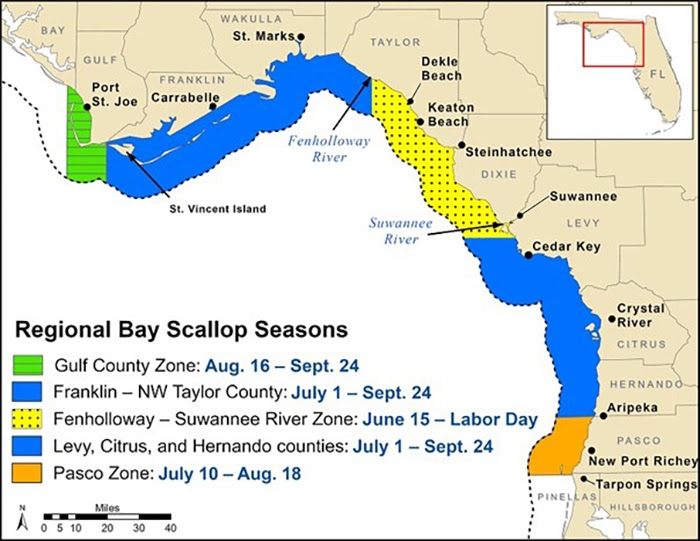Bay scallop season opens July 10 in the Pasco Zone
FWC map of Florida showing bay scallop zones and season dates. The Pasco Zone is the orange area of the map.
Florida Fish and Wildlife Conservation Commission (FWC)
The 2024 recreational bay scallop season for the Pasco Zone opens Wednesday, July 10, 2024 and will remain open through August 18, 2024. This includes all state waters south of the Hernando-Pasco county line and north of the Anclote Key Lighthouse in northern Pinellas County, including all waters of the Anclote River.
The daily bag limit is 2 gallons of whole bay scallops in the shell or 1 pint of bay scallop meat per person, with a maximum of 10 gallons of whole bay scallops in the shell or 1/2 gallon (4 pints) shucked bay scallop meat per vessel. Throughout the season, vessel limits do not allow an individual to exceed their personal bag limit.
At its February meeting, the Florida Fish and Wildlife Conservation Commission (FWC) approved a change to the bay scallop season for the Pasco Zone management region. The long-term season dates were informed by the post-2023 bay scallop season monitoring results by the FWC Fish and Wildlife Research Institute, combined with input received at virtual public workshops and in-person meetings, and public comments.
Although bay scallop season dates may vary by region, regulations do allow the direct and continuous transit of legally harvested bay scallops through closed areas. When transiting, boaters may not stop their vessels in waters that are closed to harvest; instead, they must proceed directly to the dock or ramp to land scallops in a closed area.
Recreational harvesters need a Florida saltwater fishing license to harvest bay scallops unless they are exempt from needing a license or have a no-cost shoreline fishing license and are wading from shore to collect scallops - in other words, a harvester's feet DO NOT leave the bottom to swim, snorkel or SCUBA, and harvesters DO NOT use a vessel to reach or return from the harvest location.
To purchase a Saltwater fishing license, visit GoOutdoorsFlorida.com, call toll-free 888-FISH-FLORIDA (888-347-4356), or purchase through the Fish|Hunt FL app on Apple and Android devices; download the app at this link: License.GoOutdoorsFlorida.com/Licensing/CustomerLookup.aspx.
For more information on current recreational bay scallop regulations, visit MyFWC.com/Scallops.
Boater Safety
The FWC reminds boaters to wear a life jacket when underway. Statistics show over half of boating fatality victims were reported as being able to swim. Even the strongest swimmers can be unprepared and unable to respond to a fall overboard. Over 60% of boating fatalities in Florida are caused by people falling overboard and drowning and 80% of drowning victims were not wearing a life jacket. Drownings are rare when boaters are wearing an appropriate life jacket. For more information on boating safely, visit MyFWC.com/Boating/Safety-Education.
Seagrass Awareness
It is a violation of Florida law to damage seagrass beds in some areas within state waters. Boaters should stay within the marked navigation channels whenever possible and avoid traveling through seagrass beds in shallow water, which can cause propeller scars.
• Seagrasses are the principal food for endangered marine herbivores such as manatees and green sea turtles, act as natural filters to help purify the water, and provide a suitable environment for a wide variety of marine life.
• Boaters should make all available attempts to avoid running through seagrass beds.
• Navigation charts identify seagrass beds as light green or marked as "grs" on the chart.
• Boaters should make all possible attempts to stay within channels when unfamiliar with a waterway.
• Avoid taking shortcuts through seagrass beds to avoid causing propeller scars.
• It is a violation of Florida law to damage seagrass beds in some areas within state waters.
Stow it, don’t throw it - Trash or scallop shells
Please do not discard scallop shells in inshore waters commonly used for recreational activities, such as near boat ramps or swimming areas. Piles of discarded scallop shells can create hazards for swimmers and damage seagrass habitat. Scallop shells can be discarded in a trash receptacle or in larger bodies of water where they are more likely to disperse. Also, don’t forget to stow your trash securely on your vessel so that it doesn’t blow overboard.
